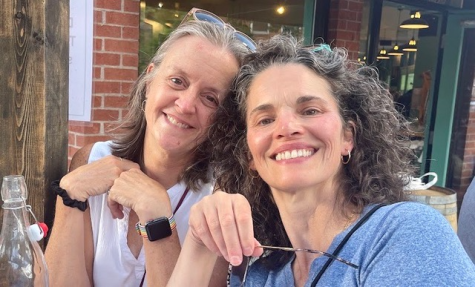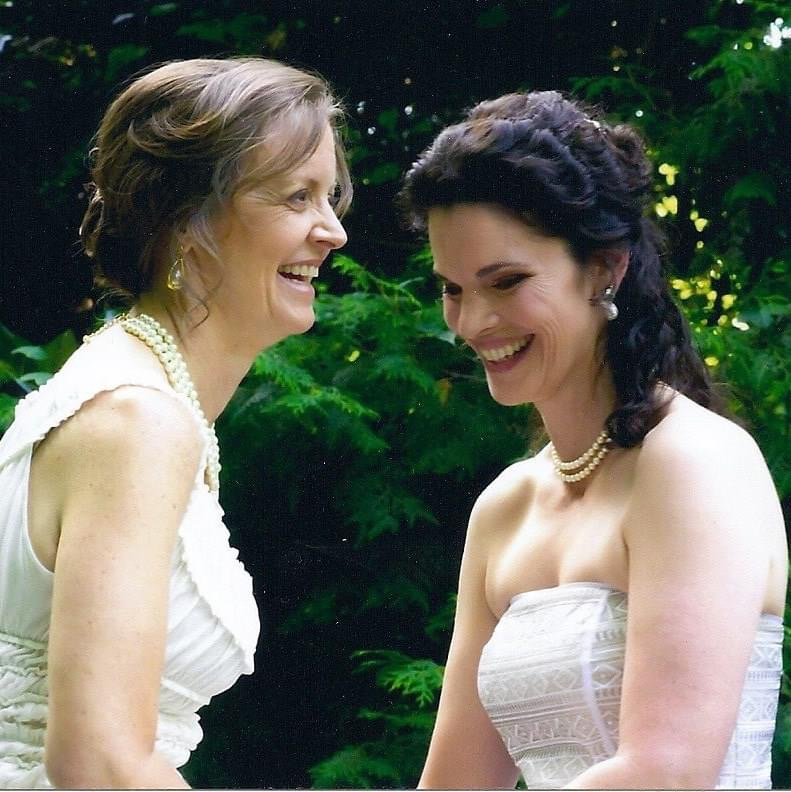A totally normal, boring love story
Jennifer Gatti and Stephanie O’Brien laughing on their wedding day.
February 25, 2023
Legislature would determine the sanctity of marriage for many, but arbitrary lines won’t stop these lovers from being just like everyone else, normal and every day.
The wedding, cliche and sappy, but a memory cherished by oh so many. This wedding ceremony was massive and thriving just as actress Jennifer Gatti had planned. Friends and family from far and wide sat in their chairs, anxiously awaiting the commencement. Surprisingly, the baptist family of Gatti’s spouse attended, just as supportive as everyone else. People from both sides of Hollywood’s cameras attended, and no shortage of friends from school. No expenses were spared. As the night progressed, it felt not so far from the Met Gala.
“I’d say it was just a totally normal wedding. We wore pretty white dresses and played music. We walked down the aisle with a traditional ceremony. We just wanted it to be something people would remember and to this day, people do,” Gatti said.
The best part of it all? The thrill of the middle finger to the North Carolina state legislature. Jennifer’s wedding was illegal at the time, illicitly held in such excess to express her distaste for what had been passed.
Amendment 1, passed in November 2012, decided by a majority in the Supreme Court of North Carolina, dictated a legal marriage would be only between one man and one woman. Federal courts held no stake in this ruling, as all marriage was dictated on a state-by-state basis.
“I’ve been a professional actress since I was 14. I grew up in New York, and my theater teacher really got me connected with agents while I was in school. I left for Los Angeles when I was 21 to act full-time,” Gatti said
Gatti lived in L.A. for almost a decade, going about life doing her job, getting gigs, acting and keeping herself professional. It was 1999, and Gatti was working on what she and her spouse often think of as the worst movie they’ve both been in.
“It was a really horrible B, maybe even a C-level film,” said Mass Communication Lecturer, Stephanie O’Brien. “I think it was the worst movie we’ve done, but we met one another.”
The film’s name was “Millennium Man,” and it was a small TV film about a CIA agent avoiding his death by having his mind transferred into another faster, stronger and better body, similar to “RoboCop.”
This was the high-time of O’Brien’s career in the film industry, even if the film they were working on at the time wasn’t in their opinion.
“O’Brien was the top dog production assistant in film and television in Wilmington during the ‘90s,” said long time friend and previous co-worker of O’Brien, Rick Kelly.
Gatti was the lead actress, while O’Brien was the second assistant director. It was just another three-week shoot for the both of them until the director decided to lift a camera he shouldn’t have. This meant a big delay for the film, but a free paid week of vacation for both of them.
It was the beginning of October when the film was supposed to wrap up. This meant the first week of October was just time to relax with the rest of the crew stuck on the film set. Something the crew knew, but seemingly unbeknownst to Gatti and O’Brien, was they both had a birthday during that empty week on set. Better yet, they had the same birthday. Gatti really attributes that time and the birthday party to her overall connection with O’Brien.
“The transportation department got us a limo and tickets to the Kansas City Chiefs versus San Diego Chargers football game for our birthday,” O’Brien said. “People meet at work a lot, it’s normal, but it’s really just that one week.”
For both O’Brien and Gatti, they didn’t make it public that they were gay. In that time there was a certain amount of shame to being publicly gay. Now, O’Brien will see couples walking down the street, holding hands, kissing and actively being together. It wasn’t the same in 1999.
The crew working with O’Brien and Gatti knew about it, but the couple kept their personal lives personal.
“I like to keep my personal and work life very separate, never usually mixing the two, but Stephanie ended up being my one exception,” Gatti said.
Shortly after the film finished production, O’Brien began to look into pursuing her master’s degree. She decided on UNC Chapel Hill.
“I would spend a semester at school, then go back to L.A. for work during my breaks and the summer. It was a constant back and forth while I was studying,” O’Brien said.
The couple was long distance most of the year. Gatti had a life in L.A. and O’Brien was constantly across the country for her master’s degree.
“Stephanie would spend a large chunk of her summer here in L.A. working, but she’d travel back home to continue her studies once the semester came. I tried to come and spend time with her iin North Carolina, but my whole life was in L.A., and I couldn’t drop it for months at a time just to spend time with Stephanie,” Gatti said.
It wasn’t an easy task to stay in touch. Smartphones weren’t even a thought, and email was barely an option. The couple turned to calling one another on the phone, multiple times a day, every day they were apart.
“It was hard, honestly. Once you get to the end of a visit you start realizing that it was going to be another two or three months without seeing one another,” O’Brien said. “I lost a lot of weight, and I was very stressed at the time. It’s really emotionally draining.”
The week before they had to leave one another was the worst. They would anticipate the dread of having to be apart for so long. Their emotions would build and their sadness would creep upon them like a long shadow cast by evening skyscrapers. They would often cry, saying their goodbyes and weeping, a small part of themselves having gone elsewhere for months on end.
Then there was the withdrawal the week after they parted. It truly was a tribulating time for the both of them. Clutched to the phones they were, the cord becoming an extension of their arms as they spoke multiple times a day.
“The biggest fear when we traveled was not being able to go and see each other in case of emergencies,” O’Brien said. “We were lucky to have a very good relationship with our doctor. We had gotten medical cards that allowed us to act in case of an accident, but it was always a looming fear that someone wouldn’t accept our cards if either of us were in trouble.”
The two would find support systems within their close friends and family, but there was always a longing for one another. They often would call two or three times a day, while they were apart. Some of their friends were baffled at the time, but now it feels so commonplace for couples to be constantly in contact.
The two were separated by an entire country, but those summers let them be together. Once O’Brien made it out of school, those summers turned into the couple living together full time in L.A.
O’Brien decided to buy a home in North Carolina, and the hills of Asheville felt just right for her. She always wanted to keep some base in a place familiar to her and close to her ties in Raleigh. Both Gatti and O’Brien used this location as a vacation home when they didn’t have anything to work on in L.A.
A few years later, the front yard of their L.A. home was littered with belongings. The furniture of the house was strewn out front, lampshades and trinkets scattered across tables and displayed proudly to the neighborhood. Anything of no significant sentimental value was out for sale, and the couple was ready to move.
O’Brien’s grandmother had lost a kidney, and her remaining was low functioning. She attended frequent dialysis, but had recently decided to stop treatment. O’Brien knew the coming weeks would see a steady decline of her loving grandmother’s health. She had to go home, so they stayed in the vacation home to spend a few weeks with her grandmother before she passed.
“Coming home made me realize that I didn’t want to be traveling everywhere all the time,” O’Brien said. “It was at this point I started to try and convince Jennifer to move everything here, in North Carolina.”
Gatti never backed down from a challenge, and enjoyed taking risks in life.
“I told Stephanie ‘Let’s see what happens! If we don’t like it, we’ll just go back,’” Gatti said.
Gatti went back to school, at both UNC Asheville and Asheville-Buncombe Technical Community College. She got into insurance sales with her degree, while still picking up smaller acting jobs in local play productions. O’Brien became a teacher at AB Technical, and they enjoyed their time living together in Asheville.
“We ran up to New York to get married, because we pretty much knew North Carolina wouldn’t have legalized same-sex marriage,” Gatti said.
“So we brought ourselves to the courthouse in my home-town and got married. One of our close friends was the witness,” O’Brien said.
Then came 2013. That year brought a striking decision from the US Supreme Court when they decided to overturn the Defense of Marriage Act. This was a federal decision to legalize same-sex marriage across the country. It didn’t matter where they were married, or what North Carolina thought about their ceremony.
“We’re just going to do this normal thing, whatever the heck that actually means to be normal, together. Now we’re just a simple old couple, worried about our retirement and 401K, thinking about how long I’m going to continue teaching or where we are going to travel next. I don’t think we could be a more boring regular couple than anyone else,” O’Brien said.
“Remember when we were young and exciting?” Gatti said.
“Now, it’s like 15 past 6 and I’m ready to go to bed!” O’Brien said.



![Brooke Pedersen [second from the right] and Luis Reyes [right] hold banners during the Wrap The Woods event.](https://thebluebanner.net/wp-content/uploads/2025/09/ELIZABETH_PRITCHITT_IMG_3470-1200x804.jpg)
















